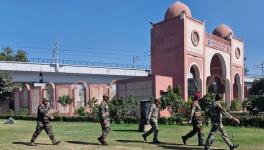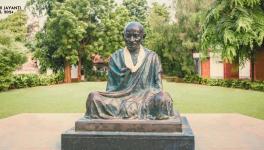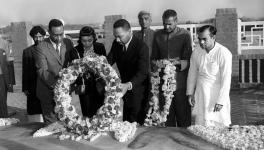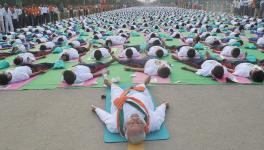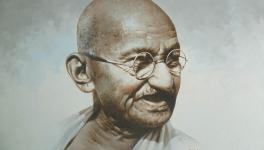Jamia – An Offspring of the Freedom Movement
Gandhi With Maulana Mohammad Ali & Maulana Shaukat Ali Aligarh 12.10.1920
In October 1920, under the shadow of serious British colonial and imperial repression in various parts of the world, a group of influential Muslim leaders in India conceptualised the foundation of a nationalist university that would be free from British colonial control.
Unrest had been simmering amongst Muslims of India with the unjust treatment meted out to their homeland, as well as to the Ottoman Empire in the wake of the First World War. This decision to establish Jamia was inspired by Gandhiji's call to establish free institutions of learning in the country.
The founders of Jamia, many of whom had launched the Khilafat movement, were led by Maulana Abdul Bari ‘Firangi Mahali’, Maulana Abul Kalam Azad, Maulana Mahmoodul Hasan, Maulana Hussain Ahmed Madni, Hakim Ajmal Khan, Maulana Hasrat Mohani, Maulana Sulaiman Nadvi and the Ali Brothers (Maulana Shaukat Ali and Maulana Mohammad Ali).
The Khilafat Committee, which was founded in March 1919 adopted Gandhi's non-cooperation programme against the British Government of India in May 1920. And later, on June 2, 1920, a conference of all parties was held at Allahabad that decided upon a policy of non-cooperation and appointed a committee to draw up a programme.
It is pertinent to note, that it was the Khilafat Committee, led by Muslim leaders, which entrusted Gandhi with the leadership of the Non-Cooperation Movement. He launched the movement as part of the Khilafat Movement by surrendering his titles and decorations to the government on August 1, 1920. This show of pan-Indian unity provided the most formidable opposition to the British Raj in India -- one that shook its very foundations by challenging its colonial logic of 'divide and rule'.
In the second week of October 1920, hundreds of prominent Indian leaders linked to the Non-Cooperation and the Khilafat movements camped in the campus of the MAO College, Aligarh (which later became the Aligarh Muslim University).
Gandhi and Maulana Mohammad Ali ‘Jauhar’ addressed students of MAO College at the Students' Union Hall. The students pledged their support to Gandhi and announced a total boycott of classes in defiance of the British administration.
Maulana Mohd. Ali Jauhar and Hakim Ajmal Khan
The British government was stunned by this convergence of Muslim anti-colonial activism and the broader Indian nationalist movement, and decided to close down MAO College, and evacuate all hostels. As a result, not just the MAO College, but also the entire Aligarh city, and gradually, most parts of India, were enraged.
It was during such trying times, that in the first week of November 1920, the self-funded Jamia Millia Islamia became operational. A true offspring of the freedom movement, its seeds were planted by Gandhi, Sheikhul-Hind (the highest priest of Islamic theologians of India) Maulana Mahmoodul Hasan, and several other prominent Muslim leaders. Hakim Ajmal Khan was appointed as its Chancellor and Maulana Mohammad Ali as Vice Chancellor.
The Jamia Millia Islamia made its humble beginning from 20 tents, which were pitched a short distance away from MAO College in Aligarh. Since Jamia was connected with the nationalist cause, it could only rely on private funding. Freedom fighters and Gandhians, such as Hakim Ajmal Khan, Dr. Mukhtar Ahmad Ansari and Abdul Majeed Khwaja not only collected funds, but even sold their own property, so that the university could survive.
Dr. Zakir Hussain with Abdul Majeed Khwaja Jamia 1927.
The cultivation of an intense ‘religious and national exhalation’ led the members of this group of patriots to endure the setbacks of their struggle. In the Jamia tents, Maulana Mohammad Ali would recite “Be dastagah-i neem ke hunuz az hawai was, Shor Ast dar saram ke saman barabar ast.” (In my yearning for the beloved, I am not without means in the present state. The madness that rages in the head is equal to the means itself). They organised discussions on the Quran and Hadith (delivered by some of the leading Ulema of the day) and basic courses on the national struggle, which were delivered by prominent leaders of the movement. By the second year, a syllabus, with a clear anti-colonial bent and based around the principle of 'Khud-Numu' (self-development), was created.
At that stage, on account of Maulana Mohammad Ali’s intense involvement in the Non-cooperation Movement, and following Gandhi’s advice, he entrusted the charge to Abdul Majeed Khwaja. Khwaja managed the affairs of Jamia for nearly five years, and when Khwaja was jailed (on account of participating in the freedom movement) his wife, Begum Khursheed Khwaja, shared the responsibility of managing the institution in Aligarh. In July 1925, when Jamia was moved to Karol Bagh, Delhi, young Dr. Zakir Hussain, who was at the time a lecturer (and later the President of India) at the AMU, resigned and took over the reins of the institution.
Nai Taleem, or life education, as enshrined in Gandhi’s concept of national basic education became the agenda for Jamia, as it began its journey at the Karol Bagh campus in Delhi. The spirit of service and sacrifice embodied by the freedom struggle engaged in by the students and teachers of Jamia, was preserved by the ‘Qaumi Hafta’- a programme on community service and humanitarian values, which commemorated the Jallianwala Bagh massacre. When the Qaumi Hafta coincided with the Civil Disobedience movement in 1931, Prof. Shafiq-ur-Rehman Qidwai and Maulvi Saad Ansari resigned from their faculty positions and joined the Satyagrah.
It is noteworthy that when Jamia was facing a financial crisis, some sympathisers suggested to Gandhi to drop the word ‘Islamia’ from the national university’s name. To this Gandhi, according to Prof. Mohammad Mujeeb (who had joined Jamia with Dr. Zakir Hussain at Karol Bagh), shot back by saying “If the word Islamia is removed from Jamia’s name, then I would not be interested in the educational institution...”. This highlighted how to him it was important that Jamia as an institution clearly symbolised the diversity of identities that now formed the Indian national movement.
When the National Muslim University's first chancellor Hakim Ajmal Khan died, Gandhi wrote to the Jamia fraternity on January 9, 1928:"... You must not lose hope. The Jamia cannot perish so long as the professors and the boys are true to it. For my part you have my promise that God willing I shall use all the powers...for putting the institution on a sound financial basis".
Over the years, Jamia strove successfully to live up to its founding ideals. In 1935, Halide Edib, the famous Turkish writer, visited Jamia to deliver a series of lectures called the ‘Jamia Millia Extension Lectures’. She later observed: “The institution has two purposes. First, to train the Muslim youth with definite ideas of their rights and duties as Indian citizens. Second, to coordinate Islamic thought and behavior with Hindu. The general aim is to create a harmonious nationhood without Muslims losing their Islamic identity. In its aim, if not always in its procedure, it is nearer to Gandhian Movement than any other Islamic institution I have come across.”
Clearly, the development of national consciousness in education and the establishment of institutions, like the Jamia Millia Islamia, were a definite victory for and legacy of the Non-cooperation and Khilafat movements.
Even such a brief glance at Jamia’s past illuminates a unique and precious chapter in the history of India’s freedom movement. It compels us to pause and reflect as to why this battle to protect the ethos of the Jamia Movement is relevant to contemporary India. As Jamia enters its centenary year and its students take to the streets against a divisive law tearing the nation apart, might history repeat itself through the launching of another Non-Cooperation movement?
The writers are alumni of AJK Mass Communication Research Institute, Jamia Millia Islamia, Delhi. The views are personal.
Get the latest reports & analysis with people's perspective on Protests, movements & deep analytical videos, discussions of the current affairs in your Telegram app. Subscribe to NewsClick's Telegram channel & get Real-Time updates on stories, as they get published on our website.












